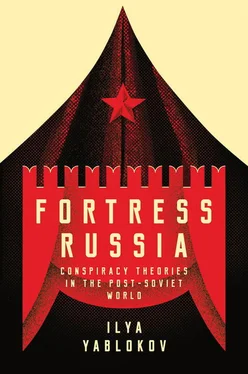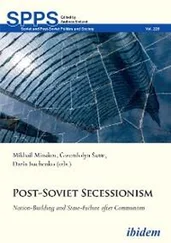The notion of Russia as a sovereign democracy makes it possible to juxtapose the subversive ‘Other’ to the sovereign Russian nation ( rossiiskaia natsiia ), and to emphasize its absolute supremacy in determining domestic policy. In his definition of ‘the people’, Surkov paid tribute to their civic character and quoted the Russian constitution: ‘The bearer of sovereignty and the only source of power in the Russian Federation shall be its multinational people’ (Surkov, 2006a). The democratically elected president Putin, who represented the majority of the people and their historical greatness, provided the basis for this sovereignty (Orlov, 2006, p. 6).
According to Surkov, in contrast to the 1990s, when Russia’s future was decided from Washington, it was Putin who now provided the Russian people with democratic elections, enabling the majority to decide on the nation’s future. In this way Surkov was claiming that the popular demand for real democracy was realized by Putin in the 2000s (Surkov, 2010, p. 98). The majority of the population had voted for him, and he had then turned Russian dreams into reality: to turn Russia into a sovereign nation and reinstate the Law and the Constitution. Hence ‘Putin’s majority’ rule the country in accordance with the principles of democracy, and any attempt to undermine this situation, from within the country or from abroad, is illegitimate and threatens the country’s stability.
Any parties or individuals who expressed criticism of Putin’s regime were automatically perceived as a potential threat to the legitimacy of the Kremlin. When describing the opposition, Surkov’s adviser, Pavlovskii, clearly stated that ‘existing Russian opposition parties may be working with outside forces to engineer a Ukrainian-style revolution against Putin. That would rob Russian rule of legitimacy, while the decision-making centre would shift to another force – one outside Russia’ (Pavlovskii, quoted in Weir, 2005). The national elite’s concern with Russian sovereignty and the lack of national unity generated a range of intellectual projects to facilitate national cohesion. These projects contributed to the public promotion of the idea of Russian greatness as a key factor in the development of Russian national identity.
The United States as Russia’s ‘Other’
In the mid 2000s, the role of Russia’s main ‘conspiring Other’ was assigned to the USA, whose active foreign policy in several regions, which the Kremlin regarded as part of Russia’s sphere of influence, caused major concern among the Russian political establishment. Immediately after 1991, when Russia and the West were enjoying a period of friendship and cooperation, a chain of events (the expansion of NATO, a lack of cooperation during the crisis in Yugoslavia, US criticism of the Chechen war) ensured that Russian elites became disillusioned with the West, and this led them to reconsider the Kremlin’s foreign policy agenda (Trenin, 2011). US attempts to dominate in post-Soviet space triggered fear in the Kremlin that Russia could lose its dominant position in post-Soviet space and, with it, any chance of re-establishing itself as a global power. This triggered conspiracy theories about attempts on the part of the US government to undermine Russian integrity and destroy the country’s economic potential by intervening in its neighbouring states. The search for Russian identity thus became closely related to issues on the global political agenda; Russian policies were constantly juxtaposed with US attempts to achieve global domination by means of Russia’s destruction.
In Surkov’s view, Russia’s primary goal was to defend her own sovereignty and identity by resisting the efforts of certain governments to gain global supremacy, with the help of bands of terrorists and criminal gangs. Sustaining sovereign democracy in Russia, according to Surkov, would guarantee a prosperous future for the nation and enable her to make great historical achievements (Surkov, 2006a). It should be noted that Surkov never provided any explicit conspiratorial analysis of US policies regarding Russia. [5]On the contrary, according to Wikileaks cables from the US embassy in Moscow, Surkov considered himself an Anglophile and admired the US as a ‘generous and humane country, a model for Russia’ (Wikileaks, 2010). However, despite Surkov’s positive view of Western culture, his conceptual framework provided pro-Kremlin intellectuals and journalists with the intellectual means to engage in unfettered anti-Western conspiratorial mythmaking.
In contrast to Surkov’s representation of the West as a complex and pluralistic community, Russian political elites became actively involved in producing and spreading conspiracy theories about Russia and the West that amalgamated images of the USA and West European countries to create a single political actor hostile to Russia. As a former Moscow mayor put it, historically, the West hated Russia because of its political and religious, as well as ethical, differences. Unlike the West, the Russian nation was not focused on financial profits, and maintained its old traditions – primarily Orthodox Christianity and the collective spirit (Luzhkov, 2007). The dominance of the USA in global politics was presented as evidence of an anti-Russian conspiracy; this became particularly clear in relation to US international policies after the Cold War. The head of the Russian Constitutional Court, Valerii Zor’kin, contended that the very sovereignty of nation states was under threat from American politicians and ideologues of the New World Order who promoted the process of globalization (Zor’kin, 2006). Zor’kin’s remark suggests that by the mid 2000s, Russian political elites had internalized conspiracy theories which were traditionally popular in the USA and European countries.
The range of ideas used in anti-Western conspiracy discourse has increased in accordance with the introduction of new terms into the mainstream political discourse, such as vashingtonskii obkom ( The Washington Regional Party Committee ) and rukovodiashchie krugi SShA ( ruling circles of the USA ). These terms are derived from Soviet propaganda and constitute an example of how post-Soviet political discourse assimilates the symbolic constructions of the Soviet past. Moreover, prominent media and government representatives have facilitated the entry of these notions into mainstream political discourse by actively using them in public.
The first term, vashingtonskii obkom , identifies the US government in Washington as the centre of anti-Russian conspiracy. Originally, this term was used by Russian nationalists to infer that the US administration was having an influence on the policies of Yeltsin’s government. It was then gradually transferred to mainstream political discourse and became an important political symbol (Maslov, 2007). Dmitrii Rogozin, who has served as Deputy Prime Minister, Russian ambassador to NATO and Duma deputy, described public protests in the aftermath of the Russian parliamentary elections in December 2011 as ‘ vashingtonskii obkom in action’ (Regional’nyi sait Kostanaiskoi oblasti, 2011). After his appointment as Deputy Prime Minister in January 2012, Rogozin developed this idea and claimed that Putin was defending the Russian people from the hegemony of the vashingtonskii obkom (Rogozin, 2012). Putin’s economic adviser Sergei Glaz’ev repeated this idea of a ‘ vashingtonskii obkom ’ in relation to the crisis in Ukraine (Glaz’ev, 2014), while Putin himself suggested that the ‘ vashingtonskii obkom ’ did not allow US politicians to attend the Victory Day ceremony in Moscow in 2015 (Putin, 2015).
The other term, rukovodiashchie krugi SShA, has been used in anti-Western conspiratorial discourse to describe groups of American and European politicians who are critical of Russia’s policies. It has also been linked to the language of Soviet propaganda about the ‘managing circles of the imperialistic bourgeoisie of the USA and England’ ( rukovodiashchie krugi imperialisticheskoi burzhuazii SShA i Anglii ). For example, Aleksei Pushkov, a prominent journalist and, since 2011, deputy in the state Duma, wrote in the aftermath of the Russo-Georgian war in 2008 that ‘the managing circles of the USA will not come to terms with the existence of an independent Russia any time soon. If we intend to assert our right to independence, we shall have to fight for it’ (Pushkov, 2009, p. 225).
Читать дальше
Конец ознакомительного отрывка
Купить книгу












